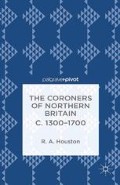Abstract
The conclusion highlights the importance of regional experience, seen through the lens of the work of coroners, to understanding Britain’s national historical development, especially changes in the personnel and workings of the law. It argues that a balance between Scottish and English perspectives has much to offer legal, social and political historians. The book provides essential historical background for understanding the work of coroners in the modern world.
Access this chapter
Tax calculation will be finalised at checkout
Purchases are for personal use only
Preview
Unable to display preview. Download preview PDF.
Notes
E W. Maitland, ‘The laws of the Anglo-Saxons’, in H. A. L. Fisher (ed.), The collected papers of Frederic William Maitland, 3 vols (Cambridge, 1911), vol. 3, 460; ‘Why the history of English law is not written’, in ibid., vol. 1, 489.
R. M. Smith, ‘“Modernization” and the corporate medieval village community in England: some sceptical reflections’, in A. R. H. Baker and D. Gregory (eds), Explorations in historical geography: interpretative essays (Cambridge: Cambridge UP, 1984), 171.
B. H. Putnam (ed.), Kent keepers of the peace, 1316–1317 (London, 1933), xxix. Stewart-Brown, Serjeants of the peace, 33–46.
N. M. W. Powell, ‘Crime and criminality in Denbighshire during the 1590s: the evidence of the records of the Great Sessions’, in J. G. Jones (ed.), Class, community and culture in Tudor Wales (Cardiff: University of Wales Press, 1989), 261–94. Hunnisett, Medieval coroner, 27–8, notes kin standing surety. In much of England, sheriffs supervised the frankpledge system through their twice yearly tourns. The absence of tourns from the north may be because the peace-keeping system was different.
J. Innes, ‘The state of the poor in eighteenth-century England in European perspective’, in J. Brewer and E. Hellmuth (eds), Rethinking Leviathan: the eighteenth-century state in Britain and Germany (Oxford: Oxford UP, 1999). 243.
Goodare, State and society, 258–9. In Tynedale (Northumberland) the system was called ‘booking’. Ellis, ‘British perspective’, 57. Henry VII tried something similar in Wales with ‘indentures of the Marches’ to deal with perversion of a once-laudable custom called arddel, where lords employed outlaws in their private armies; Henry VIII passed legislation banning the practice. J. G. Jones, Early modern Wales, c.1525–1640 (Basingstoke, 1994), 55, 72–3. In earlier Cheshire, the system of avowry seems to have been based on Welsh practices. Stewart-Brown, Serjeants of the peace, 3.
Author information
Authors and Affiliations
Copyright information
© 2014 R. A. Houston
About this chapter
Cite this chapter
Houston, R.A. (2014). Conclusion: Coroners and British history. In: The Coroners of Northern Britain c. 1300–1700. Palgrave Pivot, London. https://doi.org/10.1057/9781137381071_7
Download citation
DOI: https://doi.org/10.1057/9781137381071_7
Publisher Name: Palgrave Pivot, London
Print ISBN: 978-1-349-47952-8
Online ISBN: 978-1-137-38107-1
eBook Packages: Palgrave History CollectionHistory (R0)

